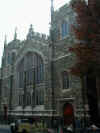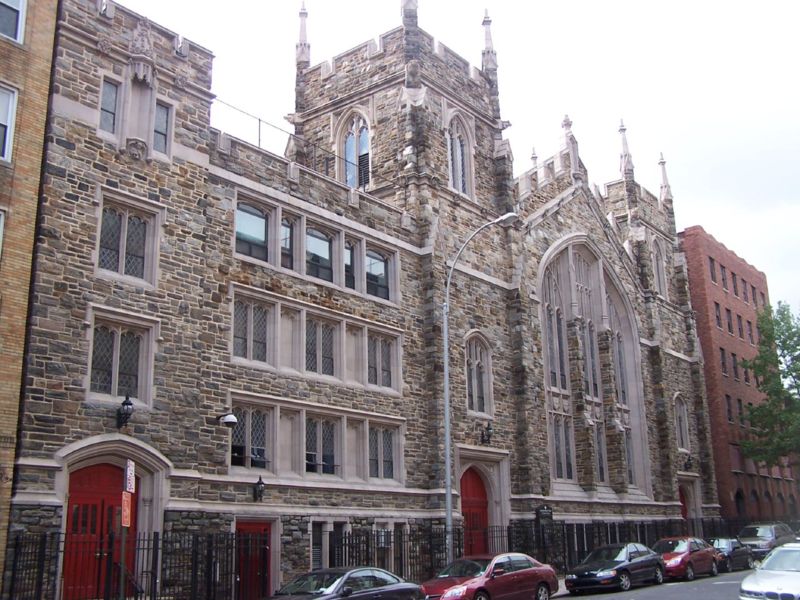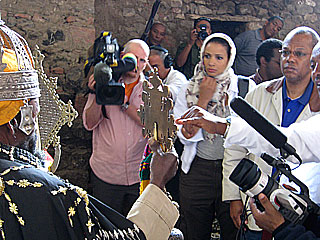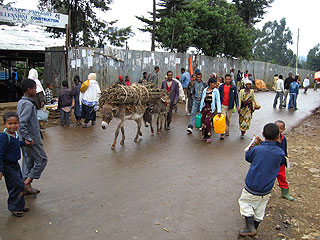 |
New York
Architecture Images-Harlem and the Heights Abyssinian Baptist Church |
|
architect |
Charles W. Bolton |
|
location |
132-142 West 138th Street |
|
date |
1923 |
|
style |
Gothic and Tudor (Neo-Gothic ) |
|
construction |
limestone |
|
type |
Church |
 |
|
|
|
  |
| Founded in 1808 at 40 Worth Street in lower Manhattan, Abyssinian Baptist Church served as a home base for both Reverend Adam Clayton Powell, Sr. and Jr. and played a major role in black history. The cavernous Gothic and Tudor (Neo-Gothic ) structure replete with imported stained-glass windows and an Italian marble pulpit was designed by Charles W. Bolton in 1923. Known as the largest and best known black congregation (weekly attendance numbers in the thousands) in the United States, Abyssinian Baptist has a superb choir and sixty-seven rank organ. Within its halls is the Powell Museum, a memorial to the late Congressman Adam Clayton Powell, Jr., containing historic photographs, written documents and other items of memorabilia. Please call before you visit. | |
|
The Abyssinian Baptist Church is among the most famous of the many
churches in Harlem, New York City. The church traces its roots to 1808, when black parishioners left the First Baptist Church of New York in protest over racially segregated seating.[1] In 1908, Adam Clayton Powell, Sr. became pastor of the church, and in 1923, he oversaw its move uptown to its current location on West 138th Street in Harlem.[1] By the time he handed the reins of the church to his son, Adam Clayton Powell, Jr., in 1935, the Abyssinian Baptist Church was the largest Protestant congregation in America. In the early 1930s Pastor Dietrich Bonhoeffer attended the church on occasions, and this experience gave him insights about the real struggle for social justice, when the Nazis took power in his German homeland. It was an important location for non-secular music in the Harlem Renaissance, and remains a center for the Harlem gospel tradition. Fats Waller's father was once minister at the church.[2] Among many important events there, the church conducted the funeral of "The Father of Blues," W.C. Handy in 1958. Today, under the direction of Rev. Calvin O. Butts, the church is a vital political, social, and religious institution in New York. |
|
|
New Yorkers Seek Religious Roots in Ethiopia Wednesday, November 21, 2007 Copyright Fox News    Ethiopian priests welcome the New York delegation in Addis Ababa. It took a 7,000 mile journey for the congregation of New York City's Abyssinian Baptist Church to find themselves. One-hundred-and-sixty members of this historic Harlem house of worship traveled in September to Ethiopia on modern-day pilgrimage to birthplace of the church's founders. "We believe that that's the real center of the redemption of Africa, the real heart of Africa," said the Rev. Calvin Butts III. "Because it's peaceful, it's never been colonized and its people are fiercely independent and self reliant, and that's how we see ourselves." Ethiopian merchants cofounded the Abyssinian Baptist Church in 1808 along with African-Americans who deserted the First Baptist Church of New York City when it decided to racially segregate seating. Doctors, lawyers, bankers, teachers and FOX News' Lauren Green were among those who made the journey to Addis Ababa, where the American delegation met with government officials and toured this nation which boasts one of the world's richest religious histories amid a backdrop of extreme poverty. "It's poverty from our perspective, but not poor in spirit," said Lamonda Williams, one of the church members who traveled to Africa. "They still treasure family; they work communally to plow the land, to mile the land, to provide everything they need." Though they took in wonders such as the 12 rock-hewn churches in Lalibela, they also absorbed the stark realities of daily life in the Horn of Africa. They saw young children who herded goats and cows and learned that an ambulance ride in the rural countryside is a horse-drawn cart, if even that. They voiced their concerns to the heads of government, including Prime Minister Meles Zenawi. "Without saying a word I think we understood No. 1 that we are brothers; No. 2, that we have the mutual concern with the people; No. 3, that we did not come to try to dictate to him what to do, but establish a conversation about the future of Ethiopia and what we might contribute," Butts said. Teacher Doris Brunson probed the ministry of education on what it was doing to improve schooling in Ethiopia. "We wanted to know why more children were not in school," Brunson said. "We more or less knew the answer to that but we wanted to find out how the government was approaching this. And we were heartened to know they are thinking of ways to get more and more children into school. But it's very difficult." And they left carrying more than just souvenirs. "The Ethiopian immediately embraces that, true to your native land: You've come home brother, you've come home sister," Butts said. "And it means so much to them, but you can't imagine what it means to us." "Going Home: A Pilgrimage," a three-part report by FOX News religion correspondent Lauren Green, begins on Nov. 22 on the FOX News Channel. Copyright Fox News |
|
|
Excerpt from Fidel Castro's Address to Abyssinian Baptist Church
in Harlem 23 October, 1995 The following is the WBAI report on Fidel's 1995 visit to Harlem and an excerpt of his talk there WBAI: Conspiculously absent from several prominent guest lists, Cuban President Fidel Castro. Mayor Guiliani refused to invite Castro to his welcoming banquet Saturday night. He wasn't welcome at President's welcoming dinner at the New York Public Library. And a memo from the mayor's office to the New York 50th. Committee listed 8 countries banned from receiving to a concert tonight. Cuba topped the list. But in Harlem last night it was a different story. Returning to the neighborhood he visited on his first trip to New York as leader of Cuba 35 years ago, Castro was greeted by an enthusiastic crowd of more that 1200 at the Abysinnian Baptist Church. In his speech lasting over an hour and frequently interrupted by cheers and standing ovations Castro spoke of his country's role in securing peace and freedom for the people of Southern Africa. FIDEL: Over 2000 Cubans shared their blood and gave their lives in this internaionalist mission, fighting colonialism for the independence of the countries of Africa. If there is something that makes us proud and makes us feel that we have discharged our duty to humannity, that is the 15 years that we fought against the South Africans, against apartheid. (Interrupted by thunderous applause and then a chant and cadent clapping: FI-DEL! clap-clap FI-DEL!) FIDEL: 15 years. For 15 years, we were there fighting apartheid. Fighting racism till the very end. What were we doing with us? They said that they ahd to impose the blockade and they were doing that they said because we were giving assistance to that country. Because we were fighting the South African racists. But that is a very interesting story, you know. Something that will one day have to be written. One of the most awful systems of discrimination and racism was the one that existed there, in that ocuntry in South Africa, tens of years after the end of fascism, and nazism, that situation existed there. However not much is talked today about that, you know. We know that history very well. We know it very well. South Africa was not blockaded! (Cheers, applause) FIDEL: South Africa was not prevented from purchasing food and medicines. ANd the country that was historically fighting against the racists, was not sold one medicine, one aspirin, one citostat (?) for a cancer patient, that was the punishment. Today everybody's happy because the apartheid is finished. Today everyone is happy because the independence of Namibia was obtained. But there was a tough struggle by Namibians, Angolans and Cubans. They had to fight very hard! (Resounding cheers!) FIDEL: For you to have an idea .. our troops were close to the South African border. A powerful, a very wealthy country, South Africa. ANd we were over 10,000 kilometers away in Cuba, we were still keeping up that fight, 10,000 kilometers away from our territory. Of course, that was not an easy task. Every time the Angolans started an offensive, the South Africans came over and fought them back. And we said to the SOviets who were the advisors to the Angolan headquarters that those offensives were wrong. They couldn't do that if they were not able to prevent the South Africans from attacking them, it was useless to conduct those offensives. They did not pay attention. They did not understand that until there was a moment when a very serious crisis was created and a moment when the war was practically lost. And we, the Cubans, we had to solve the problem. Applause FIDEL: We sent many of our best divisions, pilots, planes, and we said to them that we are going to prevent the South Africans from acting. When we arrived there there was a great crisis. It was when Cuito Carnevale took place. You know how troops Cuba sent to Angola at that moment? 55,000 troops! (Applause) And all of them on voluntary basis, that's the most important thing of all! (More applause!) In Cuito Carnevale the racists could not win. They wanted to have the battle to the east. In a difficult place. But there we lay a trap for them. We lay a trap against which they clashed. Because Cuito Carnevale became a symbol. We sent the necessary forces to stop the South Africans advancement and to force them to defeat. Why we moved 40,000 troops and 20,000 Angolan troops to the south west, to threaten them on the other side. To stop the South African army from trying something different. We were able to create the necessary balance of power simply to stop them and to obtain victory. So the implementation of Resolution 435, and at the end, to put an end to apartheid. That was our contribution to the heroic struggle of the South African people. (Applause, cheers, lengthy interruption) FIDEL: You know at the United Nations they don't speak about that. We have heard a great number of speeches. People spoke about the independence, they applauded the independence of the African country. It would seem that that was the work and miracle of the United Nations! (Calls from crowd) There were talks about the end of apartheid like the work and miracle of the United Nations. There was no mention about one Cuban of the many Cubans who died there. The name of Cuba was not even mentioned. So look how sometimes people intend to write history forgetting reality! (Cheers!) But what is the most extraordinary about this is that South Africa had become a nuclear power by then. And we knew it. We even deployed our forces in such a way that we were taking into account that South Africa had nuclear warheads. The right of the matter was whether they would decide to drop it or not. Who were they going to use the weapon against? Against us? Inside South Africa? Apartheid could not sustain even if they had the nuclear weapon. But a book has just been published where they say in South Africa at that time, they had tens of nuclear weapons. They even had nuclear grenades. They had a respectable amount of nuclear warheads. It has been described in detail in that book. In research made by American journalists and South African journalists, that was the situation at that time. Does anyone protest? Was it perhaps ignored that South Africa had the nuclear weapons at that time? Why was it that nobody said a word about that? Why was it that there was not a demonstration about South Africa having the nuclear weapon? Why? Because the Cubans were fighting there. The Cubans were the ones fighting the South Africans there, the South African racists. And apparently, some did not care whether the South Africans used the nuclear bomb against hte Cuban and Angolan troops there. That is the historical truth. That history is still to be written. More research should be made about that. According to the theory of these researchers and journalists, fascist groups and racist groups in South Africa have been able to keep some of those weapons and they have them under their control, right now. So that is history, you see. That is the way international relations work. That is the way certain people and certain countries look at history. Certain allies can manufacture as many nuclear weapons they want and nobody cares. If any other country, as it was the case of Korea, people say that they wanted to manifacture nuclear bomb, nobody knows with which resources they're going to do it. A great scandal was made. But South Africa, the racist South Africa, apartheid could have as many, as many nuclear weapons as it wanted. It was allowed have access to the nuclear eneergy. It was allowed to have as many nuclear weapons as it wanted. That's why when talking about the history of these years of revolution, I think that one of the dangerous and risky pages written by the Cubans was the one written in that struggle against the racism and apartheid in South Africa and the Namibians, and the Angolans, fought, and aside from those two countries, only Cuba was involved. Only Cuba shed its generous blood against apartheid and against racism. (Long interruption - thunderous applause) FIDEL: There are countries where more than 20,000 are leaving. There is a country in Central America, Guatemala, where over 100,000 people are leaving and that comes from the days of invasion against a democratic nation there. And I want to mention other countries that thousands of people have disappeared in Latin America. That has never happened in Cuba. (Cheers!) None of those countries have been blockaded, yet Cuba is still under blockade. And that is the reality. That is the historical reality. We are against every blockade. Anyway, blockades go against the people, against men, women and children. Against the youth and the old. It kills those people. It makes them starve. But no blockade has been as tough and as rigorous as the blcokade against Cuba. I think it is not fair to use blockade against any country, it is not logical. Because those are weapons against people, against ordinary people. There is no reason. People want to have a ban on nuclear test. Yes. We agree, all the nuclear weapons should be removed. But what is the blockade. As we were saying today at the United Nations, it's like a noiseless atom bomb. Which kills the poeple, kills the children. There is no justification for a blockade. |
|
|
links |
|
| With special thanks to www.nyc.gov | |